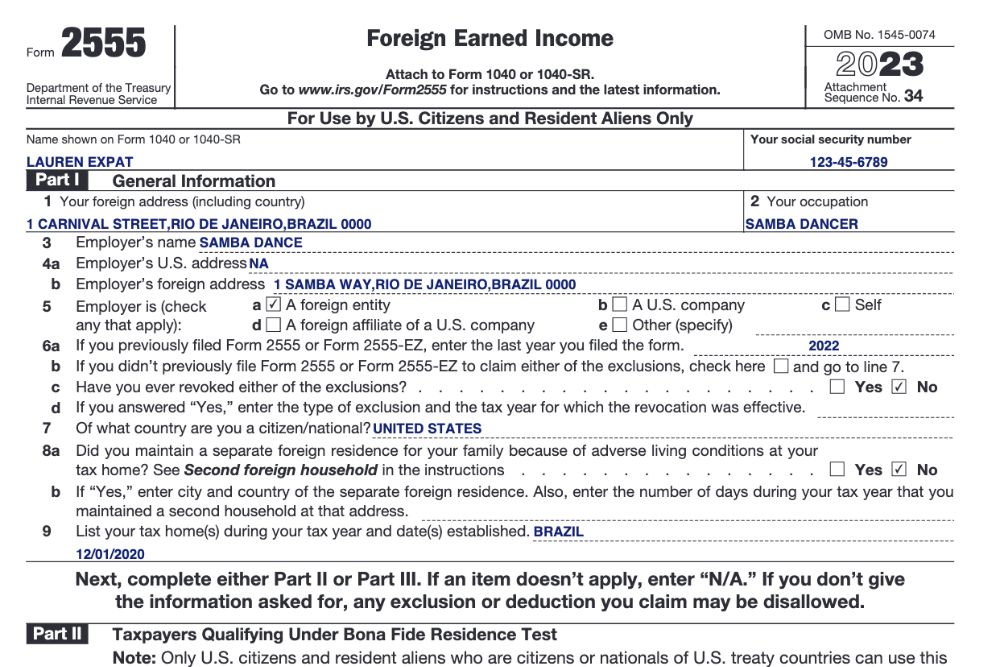The Child Tax Credit for Expats: Are You Eligible?

- What Is the Child Tax Credit?
- Do the Rules of the 2021 Child Tax Credit Still Apply?
- Can You Claim the Child Tax Credit While Living Abroad?
- Can You Claim the Child Tax Credit if Your Child Lives Abroad?
- Can US Expats Also Claim the Foreign Earned Income Exclusion?
- Still Have Questions About the Child Tax Credit for Expats?
The Child Tax Credit can help parents reduce their US tax bill even while living abroad. The credit helps offset the cost of raising children, including everything from food and clothing to school expenses and childcare. But is the Child Tax Credit available for expats? Let’s find out!
Key Takeaways
- The Child Tax Credit is a tax credit that parents can use to reduce their US tax bill and even potentially receive a refund.
- While the American Rescue Plan changed the terms of the Child Tax Credit for tax year 2021, it has reverted to its standard terms since 2022.
What Is the Child Tax Credit?
The Child Tax Credit lets parents deduct a certain amount from their US tax bill for every qualifying child they have—typically $2,000 per child. For example, if a couple has two children who qualify for the Child Tax Credit, they could reduce their US tax obligation by $4,000.
The Child Tax Credit is partially refundable, as well. Even if you don’t owe taxes, you can receive up to $1,400 per child as a tax refund. That means that if a couple owes no US taxes and has two children who qualify for the Child Tax Credit, they would be eligible for a tax refund of $2,800. The Additional Child Tax Credit or the refundable child tax credit has increased to $1,600 per child for the 2023 tax year (filed in 2024).
You can use Schedule 8812 (Form 1040) to figure out your child tax credit (CTC), credit for other dependents (ODC), and additional child tax credit (ACTC). The CTC and ODC are nonrefundable credits. The ACTC is a refundable credit.
So how do you know if your child qualifies? In most cases, they must:
- Be a US citizen
- Have a valid Social Security number before the end of the tax year
- Be 16 years or younger at the end of the tax year in question
- Live with the parent claiming the credit for at least half of that year
Those are the usual parameters for the yearly Child Tax Credit. However, in 2021, the rules were temporarily changed. For many Americans, the 2021 Child Tax Credit was an improvement over the standard credit of other years. But do those changes still apply?

Do the Rules of the 2021 Child Tax Credit Still Apply?
Unfortunately, the American Rescue Plan’s temporary increase to the Child Tax Credit expired at the end of 2021. Since 2022, the Child Tax Credit has reverted to the standard parameters.
In March of 2021, President Biden signed the American Rescue Plan, a $1.9 trillion stimulus package designed to help ease the economic burdens of the COVID-19 pandemic. One of the ways in which the American Rescue Plan does this is by making temporary changes to the Child Tax Credit for some parents.
These changes include:
- Raising the maximum age for a qualifying child from 16 to 17
- Increasing the Child Tax Credit amount to $3,600 for each qualifying child ages 0–6 and $3,000 for each qualifying child ages 7–17
- Making the Child Tax Credit fully—rather than partially—refundable
- Allowing parents to receive up to half of their Child Tax Credit in advance through six monthly payments from July 2021 to December 2021
The standard parameters apply for Child Tax Credit for the 2022 tax year. The 2021 changes were only temporary and the normal rules apply for 2022 and into the future.
Can You Claim the Child Tax Credit While Living Abroad?
Many expats wonder whether they can claim the Child Tax Credit while living abroad. The good news is that the rules for eligibility are the same, regardless of where you reside. However, claiming the Foreign Earned Income Exclusion (FEIE) may affect your eligibility for the full credit.
If you have qualifying children, you can claim the Child Tax Credit as an expat. However, if you take advantage of the FEIE, it may limit or even eliminate the amount of the Child Tax Credit you can claim. It’s important to understand how the FEIE and Child Tax Credit interact to maximize your tax benefits.
Can You Claim the Child Tax Credit if Your Child Lives Abroad?
We know that American parents living abroad may be eligible for at least the standard Child Tax Credit. But what if your children are living abroad instead of you?
Well, for a child to qualify, you must be able to claim them as a dependent. Among other factors, this requires that:
- They are a close relative, such as a son, daughter, stepchild, foster child, grandchild, sibling, niece, or nephew
- They lived with you for more than half of the year
- They provided less than half of their own support
If these are true for your child living abroad, you may be able to claim a Child Tax Credit on their behalf. Otherwise, it won’t be an option for you.
Can US Expats Also Claim the Foreign Earned Income Exclusion?
Many expats use the FEIE when filing their US taxes. The FEIE lets Americans living abroad exclude their foreign-earned income up to a threshold. For income earned in 2023, the threshold is $120,000 (For tax year 2024, the foreign earned income exclusion is $126,500)
However, you must show taxable earned income on your US tax return to qualify for the Child Tax Credit. If you use the FEIE to exclude your entire income from US taxation, you will not be eligible to claim the Child Tax Credit. If you use the FEIE but do not exclude your entire income, you can claim the Child Tax Credit but cannot receive the refundable portion of the credit.
If you have children who qualify for the Child Tax Credit, you may be better off using the Foreign Tax Credit rather than the FEIE. In many cases, this will allow you to erase your US tax obligations while still receiving the Child Tax Credit as a refund.
Still Have Questions About the Child Tax Credit for Expats?
Hopefully, this article has helped give you a better understanding of the Child Tax Credit for expats. It can be a complicated topic, however. If you still have questions about the Child Tax Credit— Contact us, and one of our customer champions will gladly help. If you need very specific advice on your specific tax situation, you can also click below to get a consultation with one of our expat tax experts.




